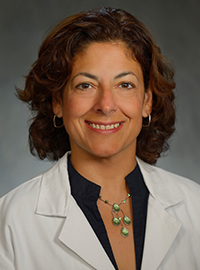 Angela DeMichele, MD, MSCE
Angela DeMichele, MD, MSCE
PHILADELPHIA – A new $3 million grant to support a clinical trial evaluating a combination therapy to prevent triple-negative breast cancer from recurring will be led in the clinic by Angela DeMichele, MD, MSCE, the Alan and Jill Miller Professor in Breast Cancer Excellence in the Abramson Cancer Center (ACC) at the University of Pennsylvania and co-director of the ACC’s 2-PREVENT Translational Center of Excellence. The grant was awarded by Stand Up 2 Cancer (SU2C) in partnership with Genentech, and will be administered by the organization’s scientific partner, the American Association for Cancer Research (AACR).
Triple-negative breast cancer (TNBC) is a tumor type in which cancer cells lack hormone epidermal growth factor receptor 2 (HER-2), estrogen receptors (ER), and progesterone receptors (PR). Because the cancer cells test negative for all three receptors, hormone therapies and drugs that target the receptors are not effective treatments. TNBC is aggressive and can spread after treatment with radiation, chemotherapy, or surgery.
“Currently, women with triple-negative breast cancer have a high risk of recurrent, metastatic disease after they are initially treated,” said DeMichele, who also serves as the co-Leader of the ACC’s Breast Cancer Research Program and director of the ACC’s Breast Cancer Clinical Trials Unit. “This trial will utilize a blood test for circulating tumor DNA to identify women at risk. Our goal is to harness the immune system to eliminate the cancer once and for all.”
DeMichele will work with team leader Elizabeth A. Mittendorf, MD, PhD, director of the breast immuno-oncology program at Dana-Farber/Brigham and Women’s Cancer Center in Boston, on this project. The team plans to use a blood test called liquid biopsy to detect the spread of the disease before it can gain a foothold in distant organs. When cancer cells are detected, patients would receive a combination of drugs. One drug is ipatasertib, which is an investigational therapy that blocks activity in the PI3K/AKT cellular signaling pathway, which can prevent cancer cells from multiplying and spreading. The second drug is atezolizumab, which is a PD-L1 inhibitor that can free the immune system to attack cancer cells.
The 2-PREVENT Translational Center of Excellence at the ACC, which DeMichele co-directs with Lewis Chodosh, MD, PhD, the Perelman Professor in Cancer Biology in the Perelman School of Medicine at the University of Pennsylvania, is a multidisciplinary research program focused on preventing recurrent breast cancer through improved understanding of breast cancer metastatic behavior, development of new technologies to find minimal residual disease and translation to novel clinical trials that target the ways in which cancer cells survive initial treatment with the goal of reducing mortality from breast cancer.
The grant is supported by SU2C Catalyst Founding Collaborator, Genentech, a member of the Roche Group, and is the latest fruit of SU2C’s collaboration with the pharmaceutical and biotechnology industry under the SU2C Catalyst® initiative. SU2C Catalyst is a collaborative program that leverages the pharmaceutical, biotechnology, diagnostic, and devices industries to accelerate the development of new treatments, and combination therapies, to patients as rapidly as possible through early-phase clinical trials or translational research.
Penn Medicine is one of the world’s leading academic medical centers, dedicated to the related missions of medical education, biomedical research, excellence in patient care, and community service. The organization consists of the University of Pennsylvania Health System and Penn’s Raymond and Ruth Perelman School of Medicine, founded in 1765 as the nation’s first medical school.
The Perelman School of Medicine is consistently among the nation's top recipients of funding from the National Institutes of Health, with $550 million awarded in the 2022 fiscal year. Home to a proud history of “firsts” in medicine, Penn Medicine teams have pioneered discoveries and innovations that have shaped modern medicine, including recent breakthroughs such as CAR T cell therapy for cancer and the mRNA technology used in COVID-19 vaccines.
The University of Pennsylvania Health System’s patient care facilities stretch from the Susquehanna River in Pennsylvania to the New Jersey shore. These include the Hospital of the University of Pennsylvania, Penn Presbyterian Medical Center, Chester County Hospital, Lancaster General Health, Penn Medicine Princeton Health, and Pennsylvania Hospital—the nation’s first hospital, founded in 1751. Additional facilities and enterprises include Good Shepherd Penn Partners, Penn Medicine at Home, Lancaster Behavioral Health Hospital, and Princeton House Behavioral Health, among others.
Penn Medicine is an $11.1 billion enterprise powered by more than 49,000 talented faculty and staff.